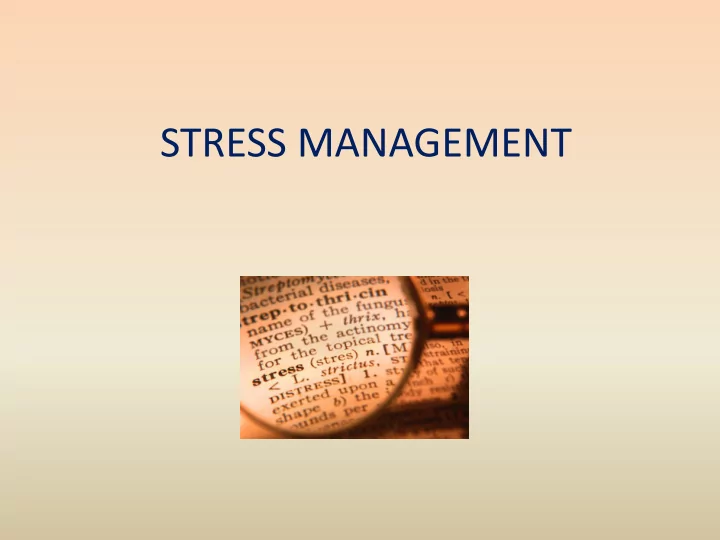

STRESS MANAGEMENT
Observable Signs of Stress Hypermobility Inability to concentrate Sweating Feels of unreality, Headaches weakness or dizziness Pain in the lower neck or Floating anxiety lower back Emotional tension • Loss or increase of appetite • Increased smoking Tendency to be easily • Increase alcohol and drug startled use Impulsive behavior • Nightmares Insomnia • Neurotic behavior General Irritability/ • Psychoses • Accident proneness excitability/ depression
Organizational Stress • Role ambiguity • Job tensions • Role conflict • Job-related threat • Role overload • Low self-esteem • Responsibility for people • Relations with others • Participation • Job dissatisfaction
The Stressor Response • Stressor--->Fight/Flight--->Strain--->Illness • We inappropriately arouse the “fight or flight” response 50-200 times per day. • Each reaction builds on the previous one until by the end of the day we have an elevated stress/tension level. Source: The Relaxation Response, Benson, Herbert
Changes Our Bodies Go Through in the “Fight or Flight” Mode • Slowdown of digestion occurs as blood is directed to the muscles and brain. • Breathing becomes more rapid to increase oxygen for the muscles. • Heart rate increased and blood pressure goes up rapidly, rushing blood to the muscles. • Perspiration increases as a cooling mechanism, allowing the body to burn more energy. • Anticipating action, the muscles become tense. • Chemicals flow into the blood to assist clotting in case of injury. • Fats and sugars are released to increase one’s energy.
What To Much Stress Can Do To You Cardiovascular System Digestive System • Heart Attack • Ulcers • Hypertension • Colitis • Angina • Constipation • Arrhythmia • Diarrhea • Migraine • Diabetes
Immunity System Skeletal-Muscular System • Infections • Backache • Allergies • Tension Headaches • Auto-Immunity • Arthritis • Cancer • Accident Prone
Self Management Techniques Good Nutritional Habits • Balanced diet • Maintenance of • Sufficient vitamins, recommended weight minerals, protein, complex • Moderate use of alcohol carbohydrates and fiber and caffeine • Minimized consumption of • No smoking sugar, salt, saturated fats, refined white flour and chemical additives • Regular meals
Good Exercise Habits Self-Awareness • Regular aerobic exercise to • Understanding of personal improve cardiovascular needs and preferences fitness • Assertive behavior and role • Regular recreational negotiation exercise for tension reduction and diversion
Letting Go Techniques Personal Planning • Regular relaxation habits • Effective time management day to day • Seeking closure on tasks • Life and career planning for and interpersonal situations the long term • Finishing unfinished business
Become Knowledgeable about Stress • Understand the process and effects of stress. • Identify your major sources of stress. • Anticipate stressful periods and plan for them. • Develop a repertoire of successful stress-management techniques and practice them. • Learn to identify the opportunities for personal growth inherent in periods of stress. • Find the level of stress that is best for you, remembering that both insufficient and excessive stress are potentially harmful.
Take a Systematic Approach to Problem Solving • Define your problem more specifically. • Gather information about the problem to put it in perspective. • Discover why the problem exists for you. • Review your experience with the present problem. • Develop and evaluate a set of alternative courses of action. • Select a course of action, and proceed with it.
Come to Terms With Your Feelings • Differentiate between your thoughts and feelings. • Do not suppress your feelings; acknowledge them to yourself, and share them with others. • Learn to be flexible and adaptive. • Honestly appraise your personal liabilities. • Accept your feelings.
Develop Effective Behavioral Skills • Do not use the word can’t when you actually mean won’t (for example, “I can’t stop smoking). • Act on your decisions. • Use free time productively. • Avoid blaming others for situations. • Learn to say NO. • Deal with problems as soon as they appear.
Establish and Maintain a Strong Support Network • Ask for help, and be receptive when it is offered. • Develop empathy for others. • List six people with whom you would like to improve your relationship. • Rid yourself of dead or damaging relationships. • Maintain high-quality relationships both on and off the job.
Develop a Style That Will Buffer Against the Effects of Stress • Regularly practice some for of each of the following types of exercise: vigorous, stretching, and recreational. • Engage regularly in some form of systematic relaxation. • Use alcohol in moderation or not at all. • Do not use tobacco.
• Obtain sufficient rest on a regular basis. • Maintain your recommend weight. • Eat a balanced diet. • Take total responsibility for your life. • Maintain an optimistic attitude. • Do not dwell on unimportant matters.
Concentrate on Positive and Spiritual Development • Adopt the attitude that no problem is too monumental to be solved. • Engage regularly in prayer or mediation. • Establish a sense of purpose and direction. • Believe in yourself.
Plan and Execute Successful Life-Style Changes • Expect to succeed. • Approach projects one step at a time. • Practice with change rigorously for 3 weeks; then decide whether to continue with it. • Celebrate successes in your life; reward yourself.
Recommend
More recommend